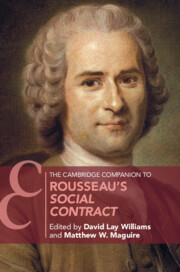Book contents
- The Cambridge Companion to Rousseau’s Social Contract
- Series page
- The Cambridge Companion to Rousseau’s Social Contract
- Copyright page
- Dedication
- Contents
- Contributors
- Acknowledgments
- 1 Introduction
- 2 “Every Legitimate Government Is Republican”
- 3 What If There Is No Legislator?
- 4 Rousseau’s Republican Citizenship
- 5 Rousseau’s Negative Liberty
- 6 Rousseau’s Ancient Ends of Legislation
- 7 Property and Possession in Rousseau’s Social Contract
- 8 Political Equality among Unequals
- 9 On the Primacy of Peoplehood
- 10 Rousseau on Voting and Electoral Laws
- 11 On the Possibility of a Modern Republic
- 12 Rousseau’s Case against Democracy
- 13 Rousseau’s Dilemma, or “Of Civil Religion”
- 14 Entreating the Political
- 15 Civil Religion and Political Unity
- Bibliography
- Index
- Series page
6 - Rousseau’s Ancient Ends of Legislation
Liberty, Equality (and Fraternity)
Published online by Cambridge University Press: 28 March 2024
- The Cambridge Companion to Rousseau’s Social Contract
- Series page
- The Cambridge Companion to Rousseau’s Social Contract
- Copyright page
- Dedication
- Contents
- Contributors
- Acknowledgments
- 1 Introduction
- 2 “Every Legitimate Government Is Republican”
- 3 What If There Is No Legislator?
- 4 Rousseau’s Republican Citizenship
- 5 Rousseau’s Negative Liberty
- 6 Rousseau’s Ancient Ends of Legislation
- 7 Property and Possession in Rousseau’s Social Contract
- 8 Political Equality among Unequals
- 9 On the Primacy of Peoplehood
- 10 Rousseau on Voting and Electoral Laws
- 11 On the Possibility of a Modern Republic
- 12 Rousseau’s Case against Democracy
- 13 Rousseau’s Dilemma, or “Of Civil Religion”
- 14 Entreating the Political
- 15 Civil Religion and Political Unity
- Bibliography
- Index
- Series page
Summary
Rousseau has long been understood as a theorist of inequality – though attention to Rousseau has been largely directed to his 1754 Discourse on the Origin of Inequality. While scholars are, naturally, right to address this central work, they would do well to consider what can be learned from other works, including The Social Contract (1762). In this text, readers often neglect a passage that Rousseau himself highlights: that “the end of every system of legislation … comes down to the following two principal objects, freedom and equality” (II.11). This chapter explores Rousseau’s understanding of freedom and equality with special attention to the latter as manifested in the problem of economic inequality. In doing so, further, it details how his thinking about freedom and equality were shaped by the ancient sources of Plato and Plutarch – his two favorite ancient thinkers. In both ancient sources, it turns out that economic equality is essential to achieving either political freedom or civil harmony. This essay, thus, not only details the centrality of economic equality to Rousseau’s political thought but also provides a serious account of how he came to this position.
- Type
- Chapter
- Information
- The Cambridge Companion to Rousseau's Social Contract , pp. 113 - 137Publisher: Cambridge University PressPrint publication year: 2024

